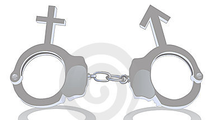 via Creative Commons I bet we've all experienced at least one of the following: (1) Being told we don't "belong" to a group we think we belong to. (2) Having someone assume we're part of a group with which we don't actually identify. (3) Hearing someone else identify with a group to which we belong, and being annoyed because we don't consider them a part of the group. Where does identity "policing" come from? And why, in the LGBTQ community,* of all places, does it seem to happen so often? I was pondering this the other day and came up with a short list of possible (no doubt interrelated, and no doubt often subconscious) reasons:
As I've talked about before, I'm no fan of identity policing. Nonetheless, I can understand the impetus behind it, and I bet I've unintentionally engaged in it. I hope I've caught myself, questioned myself, and asked where the impulse was coming from. Of course, identity policing and boundary-drawing doesn't just happen in the queer community. It happens with regard to age, race, class, and just about every other social group we can think of. Nor do I mean to suggest that identity policing always arises from bad motives, or the intention to exclude others. I suspect we'd all agree that it's important to have social and psychological spaces where we can understand ourselves, question our assumptions, and feel at home with people we believe are like us. What do you think about all of this? Have you ever seen, experienced, or engaged in identity policing? Do you think it exists in the queer community? Looking forward to hearing your thoughts.** * I was recently a guest speaker in a queer studies class in which several of the students suggested that calling LGBTQ folks a "community" is false and s ** If you feel the urge to write, "Why do we have to label ourselves at all?" or "We're all human beings," or something similar, please read this first.
13 Comments
"(2) Having someone assume we're part of a group with which we don't actually identify."
Reply
Blue
6/14/2012 09:03:17 pm
I recently was talking to somebody who said they liked to use zie (rather than he or she) 'because it's kinda fun to challenge societies expectations'. My first thought was that it sounded like this zie was trying to be cool and didn't identify as genderqueer. Then I thought, well, maybe this person didn't mean exactly what they said. Or maybe they are genderqueer but are uncomfortable saying as much, so they beat around the bush. Without having an in depth personal conversation with them, how can I really know what's going on, so I'll just give zie the benefit of the doubt.
Reply
Blue
6/14/2012 09:05:58 pm
And I did Not mean to say 'this zie'. It should read 'sounded like zie...'. Also 'societies' should read 'society’s'.
Reply
Lee
6/15/2012 02:14:02 am
Wow! Yes! This is a thing! Haha, thanks for articulating all the angles on this so well. Currently a woman in my circle who has 'had it all' in terms of acceptance and success in the mainstream het world is having a sexual identity crisis. While on the one hand I'm absolutely supportive and like, 'yay, go you!', on the other I'm having this bizarro panic, this sick to my stomach kind of feeling. Like...everyone we know already loves you best, you don't get to encroach onto my turf now! Like she's going to be a 'better' lesbian than me, haha, after I've struggled all these years and she's just waking up. Arghh! I know it's silly. I absolutely love her and want the best for her. My private feelings seem so petty and so juvenile. But they're there.
Reply
#2 is pretty much my life. (hi, maddox!) people assume i'm a cis woman (i'm not), and people assume i'm a butch lesbian until they meet my partner (let's just say my partner is... hairy).
Reply
tatiana
6/15/2012 02:34:33 pm
This is a fantastic post and I really relate to all of the points you've made - either personally or anecdotes from other people's stories.
Reply
DTanner
6/20/2012 09:43:26 pm
I was shocked as well to find out how a guy I thought a lot of , who was outwardly gay, say some pretty strong shit about a sister that walked thru the emergency room. She was very strong in appearance and the wife beater fit very very welll.....lol.....But he said, there goes another woman that wants to be a man and said it with a snarl......so did that walk on his turff....I told she didnt want to be a man.....she is already a strong as hell woman.....why would she want to be a man.......he puffed off.....What a little bitch......
Reply
EK
6/17/2012 01:41:18 pm
Superb post, and very astute, helpful responses from your commentators. This needed articulating--the world needs to read it, but, in keeping with the brutal honesty of the commentators above me, *I* needed to read it, too.
Reply
EK
6/17/2012 01:42:37 pm
[my comment was too long. The rest of it follows]
Reply
6/18/2012 02:32:40 am
Wow... That's an intense set of reactions and experiences, and I'm grateful to you for sharing. Thank you.
Reply
EK
6/18/2012 02:58:48 am
Thanks for giving us a respectful space in which to deconstruct these socially-unacceptable feelings. If I couldn't "unpack" them among receptive, thoughtful listeners (who may or may not harbor their own similar feelings and reactions), I might never be able to [try to] work through them. Self-knowledge is a priceless gift to give ourselves.
EK
6/17/2012 01:49:21 pm
[my comment was too long. The rest of it follows]
Reply
Shou Shou
7/5/2012 03:45:07 am
Dear BW,
Reply
Your comment will be posted after it is approved.
Leave a Reply. |
|

 RSS Feed
RSS Feed